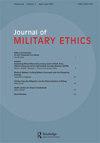Selective Conscientious Objection and the Prima Facie Duty Override Criteria
Q2 Arts and Humanities
引用次数: 0
Abstract
ABSTRACTSelective conscientious objection, a refusal to participate in a specific war due to reasons of conscience, has recently gained attention. A combatant confronted with such a decision needs guidance to help decide whether and how to object. Furthermore, those judging a combatant’s objection or failure to object need guidance. After introducing the prima facie duty override criteria, I will apply the criteria to the case of selective conscientious objection. Ultimately, I argue that the jus ad bellum criteria rebranded as the prima facie duty override criteria can help provide guidance regarding selective conscientious objection.KEYWORDS: Selective conscientious objectionprima facie dutiesjus ad bellumaggressive war AcknowledgementThe majority of this came from my 2016 PhD Dissertation at the University of Virginia. Specifically, I would like to thank Tal Brewer and James Childress. I also thank those who provided me feedback at the 2018 International Society of Military Ethics (ISME). Specifically, I would like to thank Martin Cook. Additionally, I would like to thank the reviewers and editors of the Journal of Military Ethics for their feedback. Finally, the views expressed in this work are solely my own, and do not express an official viewpoint of the Air Force or Department of Defense.Disclosure statementNo potential conflict of interest was reported by the author.Notes1 I assume the reader is already familiar with these and will not spend time discussing them. There are many variations, but I do not think the lack of a consensus lessens my overall point. I have taken my ordering from Brian Orend, but have divided “public declaration by proper authority” into two components (Citation2013, 34).Additional informationNotes on contributorsLogan SissonLogan Sisson (PhD, University of Virginia, 2016) is an Assistant Professor of Philosophy at the US Air Force Academy. His research interests include just war theory, ethics, moral injury, and human rights.选择性良心反对和表面上的责任推翻标准
选择性良心拒服兵役(selective良心拒服兵役)最近引起了人们的关注。面对这样的决定,战斗人员需要指导,以帮助决定是否以及如何反对。此外,那些判断战斗人员是否反对或不反对的人需要指导。在介绍了初步排除责任标准之后,我将把这一标准应用于选择性良心拒服兵役的案件。最后,我认为参战法标准被重新命名为初步责任超越标准可以帮助为选择性良心拒服兵役提供指导。关键词:选择性良心拒服兵役,表面上的责任,正义和侵略战争承认其中大部分来自我2016年在弗吉尼亚大学的博士论文。我特别要感谢Tal Brewer和James Childress。我也感谢那些在2018年国际军事伦理学会(ISME)上向我提供反馈的人。我特别要感谢马丁·库克。此外,我要感谢《军事伦理学杂志》的审稿人和编辑们的反馈意见。最后,本文所表达的观点仅仅是我个人的观点,不代表空军或国防部的官方观点。披露声明作者未报告潜在的利益冲突。注1:我假设读者已经熟悉了这些,不会花时间讨论它们。有许多变化,但我不认为缺乏共识会削弱我的总体观点。我接受了Brian Orend的命令,但将“适当权威的公开声明”分为两个部分(Citation2013, 34)。洛根·西森(logan Sisson, 2016年,弗吉尼亚大学博士),美国空军学院哲学助理教授。主要研究方向为正义战争理论、伦理学、道德伤害、人权等。
本文章由计算机程序翻译,如有差异,请以英文原文为准。
求助全文
约1分钟内获得全文
求助全文

 求助内容:
求助内容: 应助结果提醒方式:
应助结果提醒方式:


